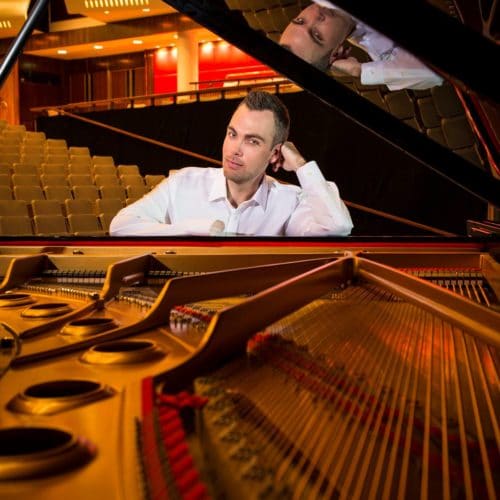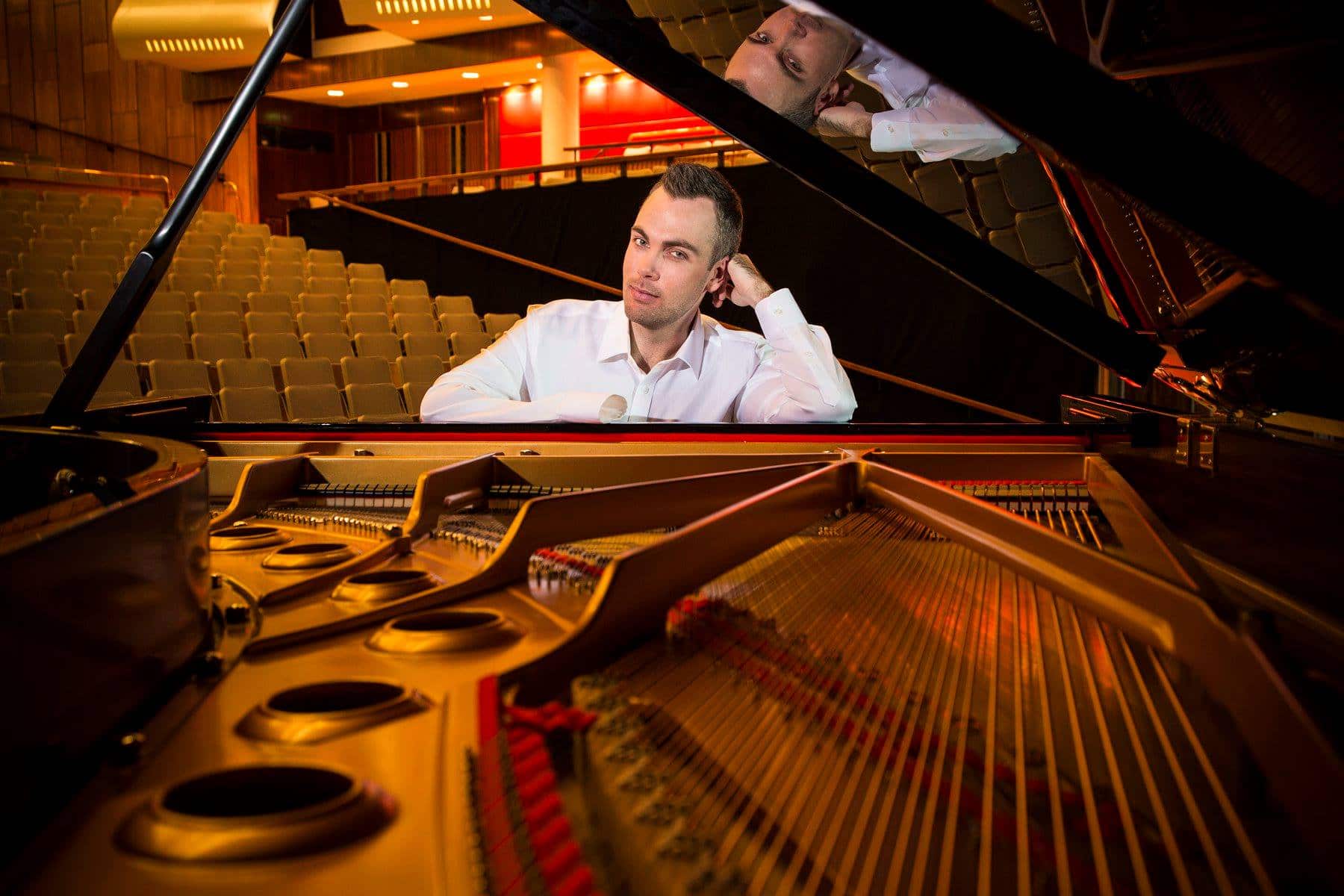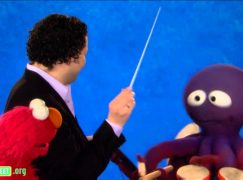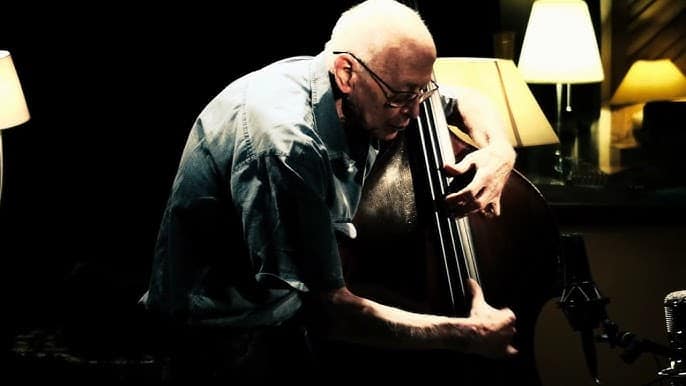Rachmaninov wrote for 2 hands. He plays with one
mainWatch what Nicholas McCarthy can do with left hand only.


Watch what Nicholas McCarthy can do with left hand only.

The autograph manuscript of the fourth movement of…

Following two excoriating articles in the UK press…

The US jazz bassist Barre Phillips, resident in…

Franz Welser-Möst has pulled out of the opening…

Session expired
Please log in again. The login page will open in a new tab. After logging in you can close it and return to this page.
A great transcription, particularly of the middle section, and similarly fantastic finger control to bring out the different parts in the middle . I am full of admiration for both the bravery and skill of left hand pianists
Performing classical piano music is not an olympian sport, but an art form, for which loyalty to the score is a conditio sine qua non.
Loyalty to the spirit of score is of primary importance.
The level of loyalty to the letter of the score depends on the period, the particular composer and work.
In every period the score was meant as to be played, i.e. all the notes which were written therein. Namely, it is in the notes where the spirit resides. The margin of subjective freedom of the performer is very small and certainly does not mean: leaving out notes because you want to show-off a trick.
Concerts where audiences appear to expect the pianist to lift the instrument with his teeth, or conductors who imitate toreadors, or sopranos in over-the-top dresses, are mere parasitic exploitations of the art form by people who don’t understand it.
He leaves-out many notes. If he leaves out more notes, he can play the piece with his nose.
You [*EXPLETIVE*] creep! And that goes for all the other critics on this thread. The man was born with one hand, for goodness sake! But he persevered and graduated from RCM. What’s wrong with you people!? Can’t you keep your mouth shut just this once? I’m shocked by the inhumanity.
you see, Byrwec, the ontology for their criticism is “the all human kind is not enough for our supremacy” and speaking epistemologically “… for they don’t know what they do …” ( as far as I remember this is from Luke)
PS And I don’t want to put my usual smile at the end here ….
Well, that’s a step in the right direction for you Alexander. Maybe we could get it to a point where you don’t even comment at all. “Just my opinion, of course…”
it was nice to see you quoting me and having positive feelings
PS Iuppiter iratus ergo nefas 😉
I’m tempted to insult you back, but will refrain. What a crude thing to say.
That’s a very undignified comment Mr. Borstlap.
Do you probably also assume that he gets paid 50% less than normal pianists for his performances?
You expect him to grow a right hand magically or something? What planet are you from?
I would invite him to Lucerne to play at Rach’s villa ….
Signor Chailly should take it into account, I think
A nice feel good attempt, but it’s not a legitimate reading of the work. Far too much is missing.
Yes, his right hand is missing. Good grief, have you no empathy? Should only people with the ‘regulation’ body parts be permitted to make music? Performances by people with less than the standard number of body parts are not legitimate? Can you seriously not appreciate the achievement here, or are you just desperate to prove how ‘critical’, how ‘clever’, how much ‘better’ you are? Pathetic.
That is, I should have thought, clear from my original post. No empathy required: if you’re putting your performances before the public you should expect them to be examined critically. Or does having one hand exempt you from the consideration of being a serious pianist? (which of course it does, it’s impossible that he is a real pianist this way). For a legitimate reading listen to Gilels, Richter, etc. Pianism is a high art, please no sensationalist one hand wonder attempts. Two hands needed.
Astounding 🙂
this reduction sucks all of the life out of the piece. why leave out the right hand, and in the process, strip the prelude of its excitement? a nice exercise for a bored pianist on a rainy afternoon, but is it really exciting enough to share…?
You ask Why leave out the right hand? Answer simple…….. he has not got a right hand. What a dumb thing to say!!
[[ why leave out the right hand ]]
Perspicacity isn’t your strong point, is it?
He left out the right hand part because he was born without a right hand. He has made his career as a professional pianist with only one hand. I’d say that’s a pretty good accomplishment.
Perhaps as a gimmick. As a good reading it fails.
Because he doesn’t *have* a right hand, that’s why.
Incredibly….useless
Agreed. A proper approach requires two hands. This is a nice thing for the feel good everyone-is-equal crowd, but pianists have two hands. This is an abbreviation, or perhaps an abomination of the work. One hand is not good enough, and no amount of careful leaps back and forth and poorly timed mechanical hesitations can change that. Two hands only, please.
Only a large blank space appears where I presume a video should be.
Three original pieces for piano left hand that really work are an etude and prelude by Scriabin, and an Etude in A-flat by Felix Blumenfeld, teacher of Anatole Kitain and Vladimir Horowitz, and uncle of Heinrich Neuhaus.
recordings by Simon Barere of Blumenfeld’s etude, one studio and a better one live; Alexis Weissenberg’s 1961 version and film of Scriabin’s exquisite nocturne; and by Vladimir Sofronitzki, the composer’s son-in-law, of Scriabin’s left-hand prelude, have to be heard to be believed.
Leopold Godowsky, called the apostle of the left hand, wrote over 50 left-hand arrangements of Chopin etudes. Most leave me a little seasick. Blumenfeld dedicated his left-hand etude to Godowsky.
Brahms successfully transcribed Bach’s Chaconne in D minor from violin to piano left hand to preserve its strenuosity without changing a note.
A couple of years ago Daniil Trifonov played this version of Chaconne in his recitals and did it very well. By the way, has anyone ever successfully performed in public any of this left-hand repertoire with their right hand instead? Seems like there is no reason for it not to be possible, but I personally have never seen or heard of anyone doing that.
I play the Bach-Brahms Chaconne with two hands because it’s such a beautiful transcription but I want to be able to play without arpeggiating so many chords. The voicing of the chords would make it next to impossible to play with the right hand alone.
Why would that be much harder than playing it with left hand alone?
The reason that virtually all single hand transcriptions are for the left hand is that the anatomy of the left hand is more suited to it, given that the thumb has to play a completely different role from what would usually be expected . There were one or two three handed pieces transcribed for Cyril Smith, who lost the use of his left hand as the result of a stroke, but he had his wife Phyllis Sellick as his two-handed duet partner
Why is “the anatomy of the left hand is more suited to it”? What is the thumb’s “expected” role? Your explanation so far is unconvincing.
As a sporting feat or a circus act, this is certainly an impressive achievement. But classical music is neither a sporting event nor a circus show. Musically, this has no value. There is plenty of piano repertoire written by noted composers for left hand specifically (Benjamin Britten, Paul Hindemith, Alexandre Tansman, Erich Wolfgang Korngold, Sergei Prokofiev, Karl Weigl, Franz Schmidt, Sergei Bortkiewicz, Richard Strauss, Maurice Ravel, Alexander Skriabin). Why not concentrate on that? If he can play the great Concerto by Ravel as wonderfully as Leon Fleischer did for three decades while his right hand was injured, then I will be the first to applaud.
I am full of admiration for the pianist, who shows an astounding degree of dexterity, having only the five fingers of one hand to work with. That said, it sounded to me like a brave attempt at playing the full score (this is Rachmaninoff’s opus 23 nr. 5 Prelude in g minor) with half the required compliment of ten digits. This for me explains the ‘disappearing’ notes that may jar a bit. For me, this guy’s skill is worth a specialized ‘for the left hand’ transcription of the prelude, as well as (any takers?) some new works, so that we can give the likes of Prokofiev and Ravel a bit of a rest.
Good point, MusicBear88, re playing Brahms’s left-hand version of Bach’s chaconne with both hands to avoid breaking the chords. Violinists have a similar problem with Bach’s original unless they use a high-arched baroque or Vegh bow. I wonder what preferred.
It’s such a great piece everyone wants to play it It even works on guitar, which it allmost fits like a glove. Only a version for harp and one for full orchestra don’t work for me.
Brahms worked from an earlier version for two hands by Joachin Raff. Busoni’s extraordinary realization of Bach’s implications is for at least two hands. Boesendorfer extended the bass of its Imperial grand so Busoni wouldn’t have to jump up an octave near the end, but few pianists use it, not even Busoni on his piano-roll.
Beethoven wrote only one chaconne but called it “32 Variations in C minor on an Original Theme”, published in the works without opus. Horowitz and Rachmaninoff played it. An early biographer’s misleading anecdote helped bury it for decades. Beethoven probably knew Bach’s. Brahms certainly did.
The big repertoire for left hand includes a sonata by Sophie Carmen Eckhard-Grammate, who was connected through her mother to Leo Tolstoy and may have been his natural daughter. She also wrote a sonata for right hand alone. They’re in Marc-Andre Hamelin’s box of her complete sonatas.